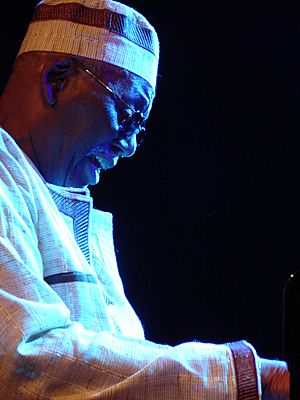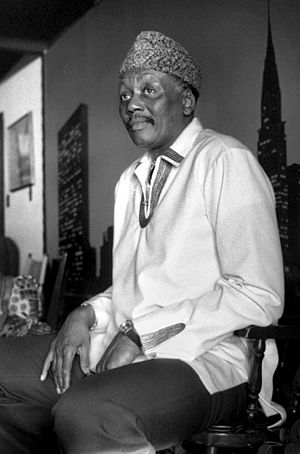Randy Weston facts for kids
Quick facts for kids
Randy Weston
|
|
|---|---|

Weston in 2007
|
|
| Background information | |
| Birth name | Randolph Edward Weston |
| Born | April 6, 1926 New York City, New York City, U.S. |
| Died | September 1, 2018 (aged 92) New York City, U.S. |
| Genres | Jazz, African jazz, world fusion |
| Occupation(s) | Musician, composer, bandleader |
| Instruments | Piano |
| Years active | 1950s–2018 |
| Labels | Riverside, Antilles, Verve, Motéma |
| Associated acts | Melba Liston |
Randolph Edward "Randy" Weston (April 6, 1926 – September 1, 2018) was an American jazz pianist and composer. He was known for his unique musical style, which was deeply inspired by his family's African roots and his own travels to Africa.
Randy Weston's piano playing was influenced by famous jazz musicians like Duke Ellington and Thelonious Monk. He also looked up to Count Basie, Nat King Cole, and Earl Hines. Starting in the 1950s, Weston often worked with the talented trombonist and arranger Melba Liston. People called him "America's African Musical Ambassador" because he used his music to teach and share the amazing culture of Africa with the world.
Contents
Randy Weston's Life and Music
His Early Life
Randolph Edward Weston was born on April 6, 1926, in New York City. He grew up in Brooklyn, where his father owned a restaurant. His father, who was of Jamaican and Panamanian descent, taught him to be independent and proud of his heritage.
As a child, Randy learned to play classical piano and took dance lessons. He went to Boys High School, which was known for its high standards. His piano teacher, Professor Atwell, let him explore different kinds of music, not just classical.
During World War II, Randy served in the U.S. Army for three years, including a year in Japan. When he returned to Brooklyn, he helped run his father's restaurant, which was a popular spot for jazz musicians. Randy admired many pianists, but Thelonious Monk had the biggest impact on him. Randy said that Monk brought "magic" back into music for him.
Starting His Music Career
In the late 1940s, Randy Weston began performing with other musicians. In 1951, he moved to Lenox, Massachusetts. There, at a place called the Music Inn, he first learned about how jazz music came from African traditions. He often returned to perform at the Music Inn, where he wrote his song "Berkshire Blues." He met many artists and thinkers there, like Langston Hughes, who helped him see the African-American experience in a global way.
Weston started his own music groups and released his first recording as a leader in 1954, called Cole Porter in a Modern Mood. In 1955, DownBeat magazine voted him the New Star Pianist. He released several great albums, including Little Niles, which was named after his children, Niles and Pamela. On this album, Melba Liston not only played trombone but also created wonderful arrangements for his songs.
Connecting with Africa
In the 1960s, Randy Weston's music really started to show strong African influences. His album Uhuru Afrika (1960) was a large musical piece that celebrated African countries gaining their independence. He worked with poet Langston Hughes on this project. Another album, Highlife (1963), was recorded after Weston's first trip to Africa in 1961. He traveled to Lagos, Nigeria, as part of a U.S. cultural exchange program. Again, he teamed up with Melba Liston for these important albums.
Weston's band during these years often featured the saxophonist Booker Ervin. He also frequently played "Niger Mambo," a song by Nigerian artist Bobby Benson, which blended Caribbean, jazz, and African styles.
In 1967, Weston traveled across Africa again. He decided to live in Morocco and opened his African Rhythms Club in Tangier. He ran the club for five years, from 1967 to 1972, featuring music from all over the African diaspora.
In 1972, he recorded Blue Moses, which became his only hit record, even though he wasn't completely happy playing electric keyboard. In 1977, he took part in FESTAC 77, a big festival of Black and African arts and culture in Lagos, Nigeria, alongside many other famous artists like Stevie Wonder.
Later Years and Legacy
Later in his career, Randy Weston continued to record music. One important album was The Spirits of Our Ancestors (1992), which featured new versions of his well-known songs and included African musicians, as well as guests like Dizzy Gillespie and Pharoah Sanders. This album is seen as a wonderful mix of "world jazz."
Weston created many popular songs, including "Hi-Fly" and "Little Niles." Other famous musicians often recorded his compositions.
He performed around the world, including at the Montreal Jazz Festival in 1995, the opening of the Bibliotheca Alexandrina in Egypt in 2002, and even at Canterbury Cathedral in England. In 2005, he played at the Kamigamo Shrine in Japan.
In 2013, he released The Roots of the Blues, a duet album with saxophonist Billy Harper. In 2015, he was an artist-in-residence at The New School in New York, where he taught and mentored students.
Randy Weston celebrated his 90th birthday in 2016 with a concert at Carnegie Hall. He continued to tour and speak internationally, performing at the Gnaoua World Music Festival in Morocco and the Montreux Jazz Festival.
His 2017 album, An African Nubian Suite, was recorded live and explored the history of humanity through music, emphasizing that "We all come from the same place – we all come from Africa." His last album, Sound (2018), was a solo piano concert recording.
Randy Weston passed away at his home in Brooklyn on September 1, 2018, at the age of 92.
Family Life
Randy Weston was married to Fatoumata Mbengue-Weston. He had three daughters, Cheryl, Pamela, and Kim. He was also a grandfather, great-grandfather, and great-great-grandfather. His son, Azzedin, passed away before him.
His Autobiography
In 2010, Randy Weston released his autobiography called African Rhythms: The Autobiography of Randy Weston. The book tells the story of his amazing journey from America to Africa and back, sharing his love for music and culture. It's considered an important book for anyone interested in jazz and African-American music.
His Archives
Randy Weston's important collection of papers, scores, videos, photos, and recordings is now kept at Harvard College Library and the Hutchins Center for African and African American Research. This collection includes letters with Langston Hughes, photos with Dizzy Gillespie and Muhammad Ali, and records from his African Rhythms Club in Morocco.
Awards and Honors
Randy Weston received many awards and honors throughout his life for his contributions to music:
- 1997: Order of Arts and Letters, France
- 1999: Swing Journal Award, Japan
- 2000: Black Star Award, Arts Critics and Reviewers Association of Ghana
- 2001: NEA Jazz Master (a very high honor for jazz musicians in the U.S.)
- 2006: Honorary degree from Brooklyn College
- 2009: Honored at a "Giants of Jazz" concert
- 2011: Guggenheim Fellowship award
- 2011: Honored by King Mohammed VI of Morocco for sharing Morocco's Gnawa music
- 2011: Honored by the Congressional Black Caucus Foundation
- 2012: Honorary Doctor of Music degree from Colby College
- 2013: Honorary degree from New England Conservatory of Music
- 2014: Doris Duke Artist Award
- 2014: JJA Jazz Award, Trio or Duo of the Year (with Billy Harper)
- 2015: JJA Jazz Award, Lifetime Achievement in Jazz
- 2016: Malcolm X Black Unity award
- 2016: Inducted into the DownBeat Hall of Fame
- 2016: United States Artists Fellowship Award
- 2017: National Jazz Museum in Harlem Legends Award
Discography
Albums as a Leader
- 1954: Cole Porter in a Modern Mood
- 1955: The Randy Weston Trio
- 1955: Get Happy with the Randy Weston Trio
- 1956: With These Hands...
- 1955–56: Trio and Solo
- 1956: Jazz à la Bohemia
- 1956: The Modern Art of Jazz by Randy Weston
- 1957: Piano á la Mode
- 1958: New Faces at Newport
- 1959: Little Niles
- 1959: Destry Rides Again
- 1959: Live at the Five Spot
- 1960: Uhuru Afrika
- 1963: Highlife
- 1964: Randy (later called African Cookbook)
- 1965: Berkshire Blues
- 1964–65: Blues
- 1966: Monterey '66
- 1969: African Cookbook
- 1969: Niles Littlebig
- 1972: Blue Moses
- 1973: Tanjah
- 1974: Carnival
- 1974: Informal Solo Piano
- 1975: Blues to Africa
- 1975: African Nite
- 1975: African Rhythms
- 1976: Randy Weston Meets Himself
- 1976: Perspective
- 1978: Rhythms-Sounds Piano
- 1984: Blue
- 1987: The Healers (with David Murray)
- 1989: Portraits of Thelonious Monk: Well You Needn't
- 1989: Portraits of Duke Ellington: Caravan
- 1989: Self Portraits: The Last Day
- 1991: The Spirits of Our Ancestors
- 1992: Marrakech in the Cool of the Evening
- 1992: The Splendid Master Gnawa Musicians of Morocco
- 1993: Volcano Blues
- 1995: Saga
- 1997: Earth Birth [featuring Montreal String Orchestra]
- 1998: Khepera
- 1999: Spirit! The Power of Music
- 2002: Ancient Future
- 2003: Live In St. Lucia
- 2004: Nuit Africa
- 2006: Zep Tepi
- 2009: The Storyteller
- 2013: The Roots of the Blues
- 2017: The African Nubian Suite
- 2018: Sound — Solo Piano
Albums as a Sideman
With Roy Brooks
- Duet in Detroit (1984)
With Charles Mingus
- Charles Mingus and Friends in Concert (1972)
Images for kids
See also
 In Spanish: Randy Weston para niños
In Spanish: Randy Weston para niños
 | Sharif Bey |
 | Hale Woodruff |
 | Richmond Barthé |
 | Purvis Young |


